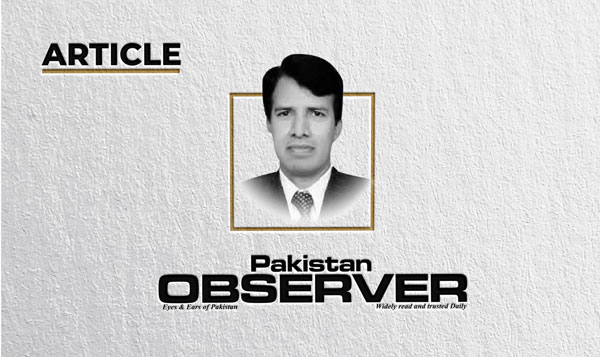Analysing changing patterns of militancy
A day after the decisive meeting of the National Security Committee (NSC), militant targeted two officials of Inter-Services Intelligence (ISI) in Khanewal District of Punjab province.
In its two consecutive meetings, NSC decided to defeat the militancy from all over the country through physical combat and securing the borders from militants who infiltrates from neighboring countries.
The ISI officials; Director NaveedSadiq and Inspector Nasir Butt were on their assigned mission (professional duty) once they were targeted.
Reportedly, they were meeting their source at the hotel to gain information about the militants.
The same source targeted them from his hidden gun. Both officials had a key role during counter terrorism operation in Punjab.
Director NaveedSadiq was awarded second highest civil award of Pakistan in 2021 for the bravery and contributions during prolonged war against terrorism.
Inspector Nasir Butt has also performed outstandingly during his duty. Pakistani nation pay rich tribute to both sons of soil for their unparalleled contributions and sacrifices.
Indeed, over 9000 personnel of security forces embraced shahdat during the war against terror.
Pakistani Nation as a whole salute all brave sons of this great nation who sacrificed their lives for the security and safety of their countrymen.
Director NaveedSadiqand Inspector Nasir Butt will be remembered for their great sacrifices forever.
Indeed, the role of ISI during war against terrorism has been exceptional. ISI get the major share in defeating this tricky war, where it was difficult to differentiate between friends and foes.
In fact, armed forces deal with the physical domain of combating the adversaries and the rival forces which act in various forms and format.
In order to be effective and for timely combating the aggression of rival forces, armed forces need timely information and early warning of the designs of rivals including the terror network.
In Pakistan, the premium intelligence agency, the Inter-Services Intelligence (ISI) acts as eyes and ears for the defence forces and other organs of the state.
Primarily ISI safeguards the national interests of Pakistan as the vanguard of armed forces and the state.
Indeed, it protects the state, its institutions and masses and paves way for the global safeguard of Pakistani national interests.
ISI is the first line of defence for Pakistan and played a crucial role in defeating the terror network and their planed operations against Pakistan.
It provides timely information and early warnings about the global and regional happenings with particular reference to their impacts on Pakistan.
Moreover, ISI through its efficient organizational structure and dedicated work force timely inform the leadership about the emerging threats and approaches to counter those threats with needed counter measures.
Owing to its most efficient recital and farsightedness, it is globally ranked among top few spying networks of the world.
The more this organization gain in term of professionalism and farsighted planning, Pakistan will be more secure and protected from the conspiracies of global spying networks and the rival forces which otherwise look for an opportunity to harm Pakistani national interests.
In last two decades, ISI has successfully unearthed and destroyed the network of terrorism, which the enemies of Pakistan have established to destabilize and weaken the state, its institutions and Pakistani society.
It has successfully unearthed the abettors, sponsors, supporters, financers and sympathizers of terrorism, extremism and radicalization both within Pakistan and across the Pakistani frontiers.
The rival international and regional spying networks have been operating from the neighbourhood of Pakistan with the aim of internal destabilization of Pakistan.
These forces have been operating from the soil of neighbouring states much before the incident of 9/11.
Indeed, the international forces planned the war on terror for the devastation of Pakistan and to create chaos among the masses for the initiation of civil war.
Alongside the armed forces of Pakistan; ISI played a decisive role to counter and finally defeat the regional and international conspiracies against Pakistan which seems to be regrouping and reforming, while taking advantage of political instability in Pakistan alongside economic dreadfulness.
In last two decades, all military operations against terrorism were preceded by the elements of this premium intelligence with timely information and access to targets.
Operation Rad-ul-Fassadwas totally intelligence based operation which has destroyed the sleeper cells of terrorists and financial basis of extremism, terrorism and radicalization.
Apart from supporting the armed forces of Pakistan on the issue of security and strategy, ISI looks after over-all national interest of Pakistan.
It plays a greater role in finding the economic opportunities for Pakistan at international level.
It also facilitates advancing the trade and commerce for the business community of Pakistan at international level.
The organization has greater role in creating a positive image of Pakistan which the rival powers have tarnished over the years.
Owing to its marvelous achievements, the regional and global spying networks have planned to harm this brilliant organization by all means, target killing of its officials and people like Director NaveedSadiq and Inspector Nasir Butt are the very recent examples.
Whereas, NSC has thoroughly reviewed the overall threat perception, emanating from the return of militancy and terrorism, there is a need to analyze the changing patterns of terrorism in Pakistan.
From targeting the ISI officials in a secured area of Punjab two clear inferences can be deduced.
One, presence of militants is not restricted to Pak-Afghan borders; they can operate anywhere in Pakistan.
Two, militants has access to identify even the concealed officials of intelligence agencies, restricting the space for intelligence based operations and source cultivation.
The new counter terrorism policy must address these changing patterns of terrorist organizations with an early framework to control the rapid resurgence of terrorism.
— The writer is Professor of Politics and IR at International Islamic University, Islamabad.










